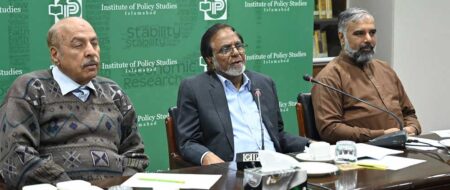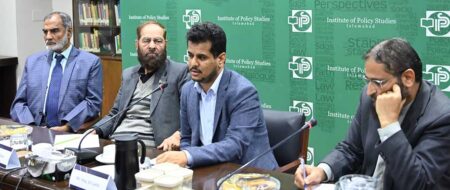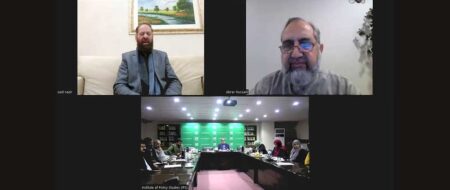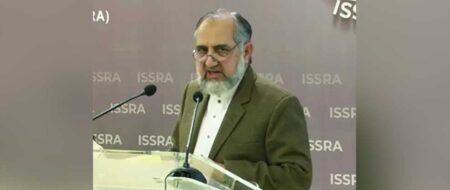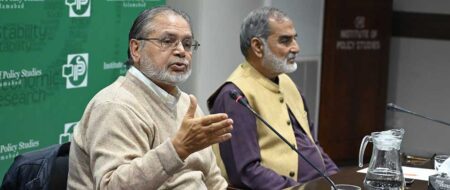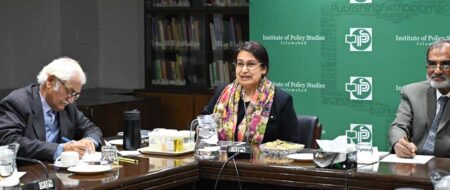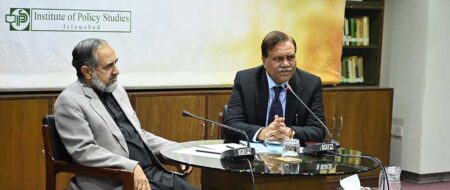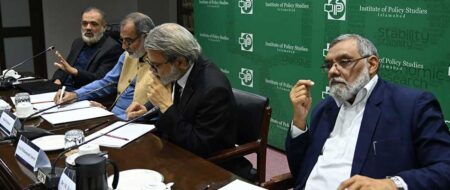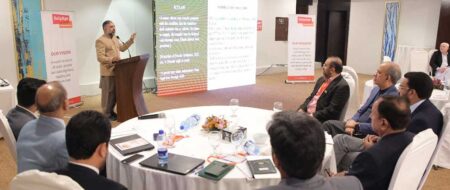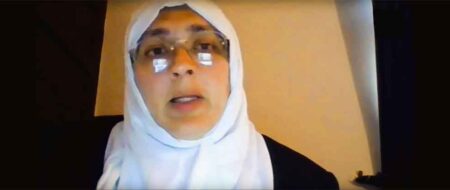Islamic Microfinance – Approaches & Practices: A Case Study of Akhuwat
Speakers at a seminar at the Institute of Policy Studies (IPS) on 20 February 2013 were of the view there have been attempts to introduce microfinance options in the country through a number of microfinance banks and institutions
Speakers at a seminar at the Institute of Policy Studies (IPS) on 20 February 2013 were of the view there have been attempts to introduce microfinance options in the country through a number of microfinance banks and institutions for poverty alleviation mainly through banking institutions but they have not gained acceptance in the Pakistani society for being interest-based and exploitative. They also viewed immense potential in Islamic microfinance as an alternative and appreciated the practices and approaches of the philanthropy-based model of Akhuwat Foundation.

The seminar titled “Islamic Microfinance – Approaches & Practices: A Case Study of Akhuwat” was chaired by eminent economist, Islamic scholar and chairman IPS, Professor Khurshid Ahmad and moderated by Dr Tahir Mansoori, DG – Shariah Academy, IIUI. The speakers included Dr Muhammad Amjad Saqib, founder and executive director, Akhuwat Foundation, Professor Khaliq-uz-Zaman, chairman, department of Islamic Banking & Finance, IIUI, Muhammad Sarim Ghazi, head, Shariah Advisory & Structuring, Al-Hidaya Center for Islamic Finance and Ameena Sohail, senior IPS associate. Various initiatives of Islamic microfinance in Pakistan, their philosophies and methodologies were highlighted in the seminar but largest of such initiatives ‘Akhuwat’ was discussed at length as a case study.
It was also observed that Islamic microfinance was still in its evolution stages and it has to study and learn lessons from experiences of corporate banking and other micro-finance initiatives.
 |
 |
Professor Khurshid Ahmad said that despite phenomenal growth in banking sector, its services remained focused at the rich segments of the society.
He deplored that even the clear State Bank’s guidelines to conventional banks to allocate twenty percent of their services for the poor were being largely ignored.
Appreciating the Akhuwat model he said that for a real change in the society, efforts have to be undertaken simultaneously with top-down as well as bottom-up approach. Those striving for real development in society should certainly work hard for improvement in governance and institutional performance but at the same time address to the needs and aspirations of the poor and help them attain a sustainable source of earning.
Commenting on Shariah regulation framework of Islamic economic institutions, he said that it should be re-thought.
 |
 |
 |
 |
“Unless experts of modern economics sit with Islamic scholars in these advisory boards, Islamic banking and financial options would remain limited in scope and restricted in operation. Innovative models in compliance with Shariah have to be evolved for reliance and sustainability”, he emphasized.
Dr. Amjad Saqib said that the Akhuwat initiative was based on the model of ‘muwakhat’ (brotherhood) established by the Prophet (PBUH) between the Muslim immigrants from Mecca and their hosts, the natives of Madinah. After a humble start twelve years ago with few thousand rupees, Akhuwat has so far lent around 3.6 billion rupees to over 260,000 families in 105 cities all over Pakistan for small business. All these loans were interest-free and were given to “economically active poor” along with entrepreneurial training and motivation to continue the cycle of mutual help on the basis of Islamic brotherhood. It was for this reason that Akhuwat has been able to attain a return rate of 99.83 percent without any litigation or coercion, he informed.
 |
 |
Dr. Tahir Mansoori said that it was very clear that people in the Muslim world, especially Pakistan, wanted to move away from interest-based economy and rapid growth of Islamic financial institutions in recent years was its clear evidence. Yet there remain some questions and confusions with respect to banking companies but such questions seem to have been taken care of in Islamic microfinance and people had shown their confidence in these experiences. He however called for a stronger and more sustainable framework and asset base for such initiatives.
Dr. Khaleeq-uz-Zaman presented a thorough comparative review of microfinance and Islamic microfinance. He also identified some areas requiring improvements and put forth some recommendations for further growth and strengthening the operations of Islamic microfinance institutions.



